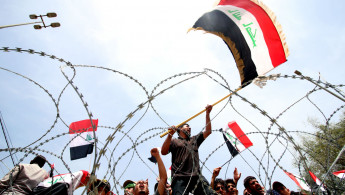With the fight won against IS, it's time for Iraq's war on corruption
After a relative respite from IS attacks in Iraq, and coinciding with triumphalist pronouncements from the Iraqi government about its heroic defeat of the group, tragedy has again struck in Iraq.
Men dressed in Iraqi Security Forces uniforms attacked the Nahrawan area, to the southeast of Baghdad. While local media sources said that up to 17 Iraqis were killed, with a further 33 injured, IS later claimed responsibility for the attack, taking credit for killing 35 PMF militiamen.
Intriguingly, Nahrawan was also the site of a famous 7th century battle between Ali ibn Abi Talib - the first Shia imam and the fourth Sunni Caliph - and the Kharijites - followers of the extremist Khawarij sect of Islam. Many Muslim scholars have likened IS to neo-Kharijites as they share their penchant for declaring fellow Muslims "unbelievers" and worthy of death, rejecting Quranic edicts for moderation.
But while it may be tempting to cast current Iraqi tensions within the larger Sunni-Shia conflicts in the region, the real jihad is against the corruption and cronyist sectarian patronage that is crippling the nation and denying Iraq's young people a future.
While corruption is not new in Iraq, under Saddam's police state there was a certain control and order to the bribery that now plagues the nation. This began to break down as 12 years of draconian UN sanctions devalued the dinar by more than 1000 percent, and state employees - still the majority of workers in Iraq - saw their monthly stipends reduced to unlivable salaries.
But everyone from the likes of Transparency International to York University professor and Marxist theory expert Salah Alnasseri agree that the chaos fuelled by the US invasion has made corruption even worse. As oil prices began to plummet over the past few years, the naked corruption in all levels of Iraqi society has become increasingly apparent, as ministries find that tens of billions worth of dollars that would have normally absorbed the shock of diving oil prices have disappeared into cronyist pockets.
 |
But with everyone from firebrand Shiah cleric Moqtada al Sadr to the deeply corrupt Iraqi government declaring war on corruption, ordinary Iraqis remain cynical. |  |
The Iraqi government itself has drawn a line between fighting terror and corruption, with the parliamentary speaker Salim Jabbouri saying this week: "The war against corruption complements the war on terror."
Timed to coincide with Prime Minister Haidar al-Abadi heightened rhetoric against corrupt officials and Tuesday's prison sentences handed down to a number of officials from the Ministry of Finance, the Media and Communications Authority as well as national real estate and banking authorities, he added:
"The parliament will assume its role in confronting corrupt figures and preserving public funds."
But with everyone from firebrand Shiah cleric Muqtada al-Sadr to the deeply corrupt Iraqi government declaring war on corruption, ordinary Iraqis remain cynical.
In fact, it's not uncommon for Iraqi victims of IS terror - largely from poor, working class neighbourhoods who lack the private protection afforded to officials in the Green Zone and whose "security" is under the auspices of the deeply corrupt army and police - to blame the government for IS bomb attacks. When officials visit areas devastated by such terror, they are often greeted by a volley of stones hurled at them by disgruntled locals.
With May 18th elections looming, the current "purge" may well be a window dressing bid for votes as well as boosting donor confidence. But connecting the dots between a destabilised, corrupt state and the ability of terror networks like IS to recruit angry, disenfranchised young men - and even soldiers - is hardly rocket science.
While post-invasion sectarianism remains an issue, corruption, like terror, crosses sectarian lines, with even the likes of the Ayatollah Sistani decrying corruption in his Friday sermons.
And while Iraq's cronyist political class try to save their own skins by declaring a kettle calling the pot black jihad against corruption, it's ordinary Iraqis who continue to pay the price.
As Iraqi film maker Maysoon Pachachi - in the midst of making a film about residents of a popular mixed-faith Baghdad neighbourhood resisting sectarian violence circa 2006 - related recently, even the renowned state-run music and ballet school in Baghdad, that has miraculously survived war and invasion, can't afford to replace their long time janitor who retired.
As the flower of Iraqi youth pirouette toward an uncertain future in a dirty ballet school, whole budgets of ministries are siphoned off and transferred to real estate assets and bank accounts abroad.
One can only hope that Abadi's current tough rhetoric will reach the top levels of government, so the deadly dance between terror and corruption will finally come to an end.
Hadani Ditmars is the author of Dancing in the No Fly Zone: a Woman's Journey Through Iraq. A former editor at New Internationalist, she has been reporting from the Middle East for two decades. Her next book, Ancient Heart, is a political travelogue of Iraqi heritage sites.
Follow her on Twitter: @HadaniDitmars





 Follow the Middle East's top stories in English at The New Arab on Google News
Follow the Middle East's top stories in English at The New Arab on Google News


